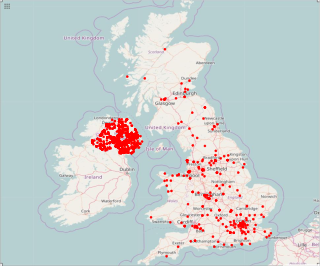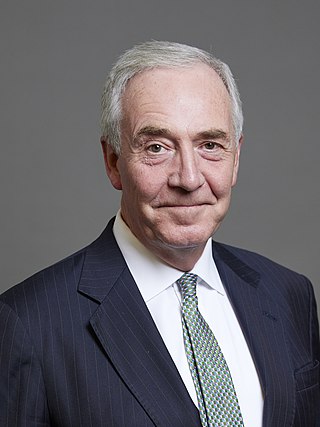
The Regulation of Investigatory Powers Act 2000 is an Act of the Parliament of the United Kingdom, regulating the powers of public bodies to carry out surveillance and investigation, and covering the interception of communications. It was introduced by the Tony Blair Labour government ostensibly to take account of technological change such as the growth of the Internet and strong encryption.

The Security Service, also known as MI5, is the United Kingdom's domestic counter-intelligence and security agency and is part of its intelligence machinery alongside the Secret Intelligence Service (MI6), Government Communications Headquarters (GCHQ), and Defence Intelligence (DI). MI5 is directed by the Joint Intelligence Committee (JIC), and the service is bound by the Security Service Act 1989. The service is directed to protect British parliamentary democracy and economic interests and to counter terrorism and espionage within the United Kingdom (UK).

Mass surveillance is the intricate surveillance of an entire or a substantial fraction of a population in order to monitor that group of citizens. The surveillance is often carried out by local and federal governments or governmental organizations, but it may also be carried out by corporations. Depending on each nation's laws and judicial systems, the legality of and the permission required to engage in mass surveillance varies. It is the single most indicative distinguishing trait of totalitarian regimes. It is often distinguished from targeted surveillance.
Foreign Terrorist Organization (FTO) is a designation for non-United States-based organizations deemed by the United States Secretary of State, in accordance with section 219 of the Immigration and Nationality Act of 1965 (INA), to be involved in what US authorities define as terrorist activities. Most of the organizations on the list are Islamist extremist groups; the rest are nationalist/separatist groups, or Marxist militant groups.
Terrorism and mass attacks in Canada includes acts of terrorism, as well as mass shootings, vehicle-ramming attacks, mass stabbings, and other such acts committed in Canada that people may associate with terroristic tactics but have not been classified as terrorism by the Canadian legal system.
Data retention defines the policies of persistent data and records management for meeting legal and business data archival requirements. Although sometimes interchangeable, it is not to be confused with the Data Protection Act 1998.

The Counter-Terrorism Act 2008 is an act of the Parliament of the United Kingdom which increased police powers for the stated purpose of countering terrorism. The first reading of the bill was held in January 2008, and it received royal assent on 26 November 2008 following an episode of Parliamentary ping-pong on some of its most controversial issues.

Terrorism in the United Kingdom, according to the Home Office, poses a significant threat to the state. There have been various causes of terrorism in the UK. Before the 2000s, most attacks were linked to the Northern Ireland conflict. In the late 20th century there were also attacks by Islamic terrorist groups. Since 1970, there have been at least 3,395 terrorist-related deaths in the UK, the highest in western Europe. The vast majority of the deaths were linked to the Northern Ireland conflict and happened in Northern Ireland. In mainland Great Britain, there were 430 terrorist-related deaths between 1971 and 2001. Of these, 125 deaths were linked to the Northern Ireland conflict, and 305 deaths were linked to other causes, including 270 in the Lockerbie bombing. Since 2001, there have been almost 100 terrorist-related deaths in Great Britain.
CONTEST is the United Kingdom's counter-terrorism strategy, first developed by Sir David Omand and the Home Office in early 2003 as the immediate response to 9/11, and a revised version was made public in 2006. Further revisions were published on 24 March 2009, 11 July 2011 and June 2018. An Annual Report on the implementation of CONTEST was released in March 2010 and in April 2014. The aim of the strategy is "to reduce the risk to the UK and its interests overseas from terrorism so that people can go about their lives freely and with confidence." The success of this strategy is not linked to total elimination of the terrorist threat, but to reducing the threat sufficiently to allow the citizens a normal life free from fear.
Richard Martin Donne Barrett CMG OBE is a former British diplomat and intelligence officer now involved in countering violent extremism. Barrett is a recognised global expert on terrorism who frequently appears as a panellist in related conferences and whose commentary is regularly featured in the press.
The Independent Reviewer of Terrorism Legislation is appointed by the Home Secretary and by the Treasury for a renewable three-year term and tasked with reporting to the Home Secretary and to Parliament on the operation of counter-terrorism law in the UK.
The Communications Capabilities Development Programme (CCDP) is a UK government initiative to extend the government's capabilities for lawful interception and storage of communications data. It would involve the logging of every telephone call, email and text message between every inhabitant of the UK, and is intended to extend beyond the realms of conventional telecommunications media to log communications within social networking platforms such as Twitter and Facebook.
Sir Charles Blandford Farr was a British civil servant, intelligence officer, and diplomat. He was Chairman of the Joint Intelligence Committee and Head of the Joint Intelligence Organisation at the Cabinet Office until his death in February 2019. Before that, from 2007 until 2015 Farr was the Director of the Office for Security and Counter-Terrorism (OSCT) at the United Kingdom's Home Office.
The Draft Communications Data Bill was draft legislation proposed by then Home Secretary Theresa May in the United Kingdom which would require Internet service providers and mobile phone companies to maintain records of each user's internet browsing activity, email correspondence, voice calls, internet gaming, and mobile phone messaging services and store the records for 12 months. Retention of email and telephone contact data for this time is already required by the Data Retention Regulations 2014. The anticipated cost was £1.8 billion.

The use of electronic surveillance by the United Kingdom grew from the development of signal intelligence and pioneering code breaking during World War II. In the post-war period, the Government Communications Headquarters (GCHQ) was formed and participated in programmes such as the Five Eyes collaboration of English-speaking nations. This focused on intercepting electronic communications, with substantial increases in surveillance capabilities over time. A series of media reports in 2013 revealed bulk collection and surveillance capabilities, including collection and sharing collaborations between GCHQ and the United States' National Security Agency. These were commonly described by the media and civil liberties groups as mass surveillance. Similar capabilities exist in other countries, including western European countries.
The Government of the United Kingdom maintains several intelligence agencies that deal with secret intelligence. These agencies are responsible for collecting, analysing and exploiting foreign and domestic intelligence, providing military intelligence, and performing espionage and counter-espionage. Their intelligence assessments contribute to the conduct of the foreign relations of the United Kingdom, maintaining the national security of the United Kingdom, military planning, public safety, and law enforcement in the United Kingdom. The four main agencies are the Secret Intelligence Service, the Security Service (MI5), the Government Communications Headquarters (GCHQ) and Defence Intelligence (DI). The agencies are organised under three government departments, the Foreign Office, the Home Office and the Ministry of Defence.

The Data Retention and Investigatory Powers Act 2014 was an Act of the Parliament of the United Kingdom, repealed in 2016. It received Royal Assent on 17 July 2014, after being introduced on 14 July 2014. The purpose of the legislation was to allow security services to continue to have access to phone and internet records of individuals following a previous repeal of these rights by the Court of Justice of the European Union. The act was criticised by some Members of Parliament for the speed at which the act was passed through parliament, by some groups as being an infringement of privacy.

The Investigatory Powers Act 2016 is an Act of the Parliament of the United Kingdom which received royal assent on 29 November 2016. Its different parts came into force on various dates from 30 December 2016. The Act comprehensively sets out and in limited respects expands the electronic surveillance powers of the British intelligence agencies and police. It also claims to improve the safeguards on the exercise of those powers.

David William Kinloch Anderson, Baron Anderson of Ipswich, is a British barrister and life peer, who was the Independent Reviewer of Terrorism Legislation in the United Kingdom between 2011 and 2017. On 8 June 2018 it was announced that he would be introduced to the House of Lords as a cross-bench (non-party) working peer. On the same day he was appointed a Knight Commander of the Order of the British Empire (KBE), for services to national security and civil liberties, in the Queen's 2018 Birthday Honours.
The Special Envoy on Intelligence and Law Enforcement Data Sharing is a British creation of the diplomatic corps at Cabinet level to report on, and facilitate dialogue between the executive branch of government and technology firms, often global in nature, that provide service in the internet realm.





